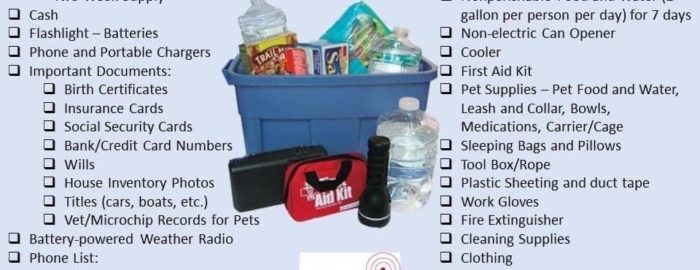
As Florida residents, we understand the importance of being prepared for hurricane season. With the season officially starting on June 1st and running through November 30th, it’s crucial to take proactive steps now to ensure the safety of you and your loved ones.
📦 Essential Hurricane Supply Checklist
Being self-sufficient for at least 7 days is vital. Here’s what you should have on hand:
- Water: One gallon per person (and pet) per day.
- Non-perishable food: Canned goods, dry snacks, and ready-to-eat meals.
- Manual can opener: In case of power outages.
- First aid kit: Include necessary prescription medications.
- Flashlights and extra batteries: Avoid using candles due to fire hazards.
- Battery-powered or hand-crank radio: To stay updated on emergency broadcasts.
- Portable phone chargers: Keep devices charged.
- Cash: ATMs and card readers may not work during power outages.
- Important documents: Store copies of IDs, insurance papers, and medical records in a waterproof container.
- Personal hygiene items: Toilet paper, hand sanitizer, and feminine products.
- Pet supplies: Food, water, medications, and comfort items.
- Gasoline: Fill up your vehicle and any approved gas containers.
- Generator: Ensure it’s in working order and you have fuel.
For a detailed checklist, visit the Florida Disaster Supply Kit Checklist.
🏠 Home Preparation Tips
- Document your property: Take videos or photos of your home’s interior and exterior for insurance purposes.
- Secure outdoor items: Bring in or anchor down furniture, grills, and other objects that could become projectiles.
- Protect windows and doors: Install storm shutters or board up windows to prevent damage.
- Check your roof and gutters: Ensure they’re in good condition and free of debris.
- Trim trees and shrubs: Reduce the risk of branches damaging your home.
🚗 Evacuation Planning
- Know your evacuation zone: Find out if you live in a mandatory evacuation area by visiting Know Your Zone.
- Plan your route: Familiarize yourself with local evacuation routes and have a backup plan.
- Identify shelters: Know the locations of nearby shelters, especially those that accommodate pets.
- Communicate your plan: Inform family and friends of your evacuation plans and destinations.
- Leave early: Don’t wait until the last minute; traffic congestion and fuel shortages can occur.
For more detailed evacuation planning, refer to the Florida Disaster Evacuation Plan.
🐾 Pet Preparedness
- Include pets in your plan: Never leave them behind.
- Prepare a pet emergency kit: Food, water, medications, leashes, and comfort items.
- Know pet-friendly shelters: Research which shelters or hotels accept pets.
📲 Stay Informed
- Sign up for alerts: Enroll in local emergency notification systems.
- Monitor weather updates: Keep an eye on forecasts from trusted sources like the National Hurricane Center.
- Follow local authorities: Stay connected with your county’s emergency management for real-time information.


